|
|
|
Sort Order |
|
|
|
Items / Page
|
|
|
|
|
|
|
| Srl | Item |
| 1 |
ID:
154922
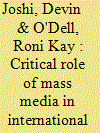

|
|
|
|
|
| Summary/Abstract |
What role does mass media play in the promotion of global norms? We address this question through an analysis of Human Development Reports (HDRs) produced by the United Nations Development Programme. Although HDRs have promoted human development ideology over the past twenty-five years, little is known about how and to what extent their messages have been disseminated to the public. Addressing this gap in the literature, we examine a critical intervening factor in the process of international norm diffusion: political communication via the mass media. Highlighting the importance of framing and agenda setting, we identify four communicative mechanisms that can facilitate norm diffusion: credibility, persistence, resonance, and decentralization. Through qualitative and quantitative content analysis, we assess how these mechanisms have enabled HDRs to attract favorable global media attention such that they are now cited much more frequently than their rival, the World Bank's World Development Reports.
|
|
|
|
|
|
|
|
|
|
|
|
|
|
|
|
| 2 |
ID:
156230
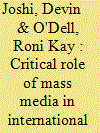

|
|
|
|
|
| Summary/Abstract |
What role does mass media play in the promotion of global norms? We address this question through an analysis of Human Development Reports (HDRs) produced by the United Nations Development Programme. Although HDRs have promoted human development ideology over the past twenty-five years, little is known about how and to what extent their messages have been disseminated to the public. Addressing this gap in the literature, we examine a critical intervening factor in the process of international norm diffusion: political communication via the mass media. Highlighting the importance of framing and agenda setting, we identify four communicative mechanisms that can facilitate norm diffusion: credibility, persistence, resonance, and decentralization. Through qualitative and quantitative content analysis, we assess how these mechanisms have enabled HDRs to attract favorable global media attention such that they are now cited much more frequently than their rival, the World Bank's World Development Reports.
|
|
|
|
|
|
|
|
|
|
|
|
|
|
|
|
| 3 |
ID:
156227
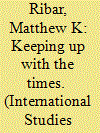

|
|
|
|
|
| Summary/Abstract |
This article examines how the discipline of international relations (IR) engages with the policy process by investigating the discipline’s responsiveness to world events. To this end, the article deploys a mixed-methods approach using historical data of journal articles in twelve top IR journals covering 1980 to 2012 from the Teaching, Research, and International Policy (TRIP) Project as well as a series of interviews with scholars to show how four major world events, or benchmark events, influence the discipline of international relations. The paper finds that benchmark events do cause a shift in the subject areas in which IR scholars publish, as well as a shift in the popularity of theoretical approaches in which scholars ground their research. Benchmark events do not, however, cause a significant shift in where in the world IR scholars study. A series of elite interviews with IR professors is used to elaborate a causal mechanism for these correlations.
|
|
|
|
|
|
|
|
|
|
|
|
|
|
|
|
| 4 |
ID:
154920
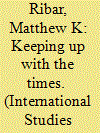

|
|
|
|
|
| Summary/Abstract |
This article examines how the discipline of international relations (IR) engages with the policy process by investigating the discipline’s responsiveness to world events. To this end, the article deploys a mixed-methods approach using historical data of journal articles in twelve top IR journals covering 1980 to 2012 from the Teaching, Research, and International Policy (TRIP) Project as well as a series of interviews with scholars to show how four major world events, or benchmark events, influence the discipline of international relations. The paper finds that benchmark events do cause a shift in the subject areas in which IR scholars publish, as well as a shift in the popularity of theoretical approaches in which scholars ground their research. Benchmark events do not, however, cause a significant shift in where in the world IR scholars study. A series of elite interviews with IR professors is used to elaborate a causal mechanism for these correlations.
|
|
|
|
|
|
|
|
|
|
|
|
|
|
|
|
| 5 |
ID:
154921


|
|
|
|
|
| Summary/Abstract |
Why do states take the lead in diffusing norms they once resisted? I address this question in the context of new humanitarian arms trade norms, culminating in the 2013 Arms Trade Treaty (ATT). Although most major arms exporting states have supported the ATT and similar initiatives, only some have chosen to invest resources in becoming leaders of these initiatives to spread new norms beyond their borders. I examine British and German arms export policies and practices to argue that states that choose leadership following costly norm adoption may do so as a means to share the costs of those norms with other international actors and reduce future adaptation costs. By delving deeper into the agency of norm diffusion, the article offers insights into powerful states’ motivations for norm leadership following costly norm adoption, the dynamics of norm diffusion, and the institutional form international norms eventually take.
|
|
|
|
|
|
|
|
|
|
|
|
|
|
|
|
| 6 |
ID:
156228
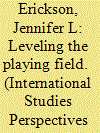

|
|
|
|
|
| Summary/Abstract |
Why do states take the lead in diffusing norms they once resisted? I address this question in the context of new humanitarian arms trade norms, culminating in the 2013 Arms Trade Treaty (ATT). Although most major arms exporting states have supported the ATT and similar initiatives, only some have chosen to invest resources in becoming leaders of these initiatives to spread new norms beyond their borders. I examine British and German arms export policies and practices to argue that states that choose leadership following costly norm adoption may do so as a means to share the costs of those norms with other international actors and reduce future adaptation costs. By delving deeper into the agency of norm diffusion, the article offers insights into powerful states’ motivations for norm leadership following costly norm adoption, the dynamics of norm diffusion, and the institutional form international norms eventually take.
|
|
|
|
|
|
|
|
|
|
|
|
|
|
|
|
| 7 |
ID:
156225


|
|
|
|
|
| Summary/Abstract |
Geopolitics is a topic that again has taken the frontline in discussions of how to interpret Russia's foreign policy or Russia's relations with the West. Geopolitical thinking in Russia has often been identified with different schools of neo-Eurasianism, extreme versions of which contain expansionist, nationalist ideas. However, these schools do not characterize university teaching of geopolitics in Russia as a whole. Instead, teachers of geopolitics focus mainly on introducing various theoretical models and criticizing representatives of neo-Eurasianism. The purpose of this article is to demonstrate with survey data that there are differences in what we might call the published discipline and the taught discipline of geopolitics in Russia.
|
|
|
|
|
|
|
|
|
|
|
|
|
|
|
|
| 8 |
ID:
154919


|
|
|
|
|
| Summary/Abstract |
Geopolitics is a topic that again has taken the frontline in discussions of how to interpret Russia's foreign policy or Russia's relations with the West. Geopolitical thinking in Russia has often been identified with different schools of neo-Eurasianism, extreme versions of which contain expansionist, nationalist ideas. However, these schools do not characterize university teaching of geopolitics in Russia as a whole. Instead, teachers of geopolitics focus mainly on introducing various theoretical models and criticizing representatives of neo-Eurasianism. The purpose of this article is to demonstrate with survey data that there are differences in what we might call the published discipline and the taught discipline of geopolitics in Russia.
|
|
|
|
|
|
|
|
|
|
|
|
|
|
|
|
| 9 |
ID:
156224
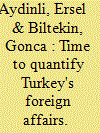

|
|
|
|
|
| Summary/Abstract |
The first part of this article discusses the current state of International Relations (IR) in Turkey and begins with the argument that the local disciplinary community shows a lack of adequate communication and interactive scholarly debates, and therefore of knowledge accumulation. This article proposes that the growth of such engagement could be encouraged by increased methodological diversity, in particular additional research using quantitative methods. It argues that quantitative research could contribute to engagement by providing conceptual and methodological clarity around which scholarly debates could develop and ultimately contribute to Turkish IR's progress as a disciplinary community. To substantiate these claims, this article goes on to discuss the development and contributions of quantitative research to global IR and illustrates the potential benefits of using quantitative methods in the study of Turkish foreign affairs.
|
|
|
|
|
|
|
|
|
|
|
|
|
|
|
|
| 10 |
ID:
154918
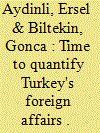

|
|
|
|
|
| Summary/Abstract |
The first part of this article discusses the current state of International Relations (IR) in Turkey and begins with the argument that the local disciplinary community shows a lack of adequate communication and interactive scholarly debates, and therefore of knowledge accumulation. This article proposes that the growth of such engagement could be encouraged by increased methodological diversity, in particular additional research using quantitative methods. It argues that quantitative research could contribute to engagement by providing conceptual and methodological clarity around which scholarly debates could develop and ultimately contribute to Turkish IR's progress as a disciplinary community. To substantiate these claims, this article goes on to discuss the development and contributions of quantitative research to global IR and illustrates the potential benefits of using quantitative methods in the study of Turkish foreign affairs.
|
|
|
|
|
|
|
|
|
|
|
|
|
|
|
|
| 11 |
ID:
154917
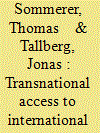

|
|
|
|
|
| Summary/Abstract |
This article introduces a new data set on the access of transnational actors (TNAs) to international organizations (IOs). While IOs were long the exclusive preserve of member governments, recent decades have witnessed a shift toward more inclusive forms of governance, involving participation by non-governmental organizations, philanthropic foundations, multinational corporations, and other forms of TNAs. Yet existing research has lacked the data necessary to map this phenomenon and its variation over dimensions such as time, issue areas, and world regions. The TRANSACCESS data set is designed for this purpose and contains information on the level of openness in 298 bodies of 50 IOs from 1950 to 2010. On the basis of this data set, we also introduce a first quantitative measure of institutional openness in the shape of a composite index, available at both the IO and body levels. This index can be used to compare TNA access across and within IOs but also as a variable in large-N studies on global and regional governance, where IO openness is potentially relevant.
|
|
|
|
|
|
|
|
|
|
|
|
|
|
|
|
| 12 |
ID:
156223
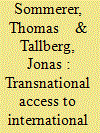

|
|
|
|
|
| Summary/Abstract |
This article introduces a new data set on the access of transnational actors (TNAs) to international organizations (IOs). While IOs were long the exclusive preserve of member governments, recent decades have witnessed a shift toward more inclusive forms of governance, involving participation by non-governmental organizations, philanthropic foundations, multinational corporations, and other forms of TNAs. Yet existing research has lacked the data necessary to map this phenomenon and its variation over dimensions such as time, issue areas, and world regions. The TRANSACCESS data set is designed for this purpose and contains information on the level of openness in 298 bodies of 50 IOs from 1950 to 2010. On the basis of this data set, we also introduce a first quantitative measure of institutional openness in the shape of a composite index, available at both the IO and body levels. This index can be used to compare TNA access across and within IOs but also as a variable in large-N studies on global and regional governance, where IO openness is potentially relevant.
|
|
|
|
|
|
|
|
|
|
|
|
|
|
|
|
|
|
|
|
|